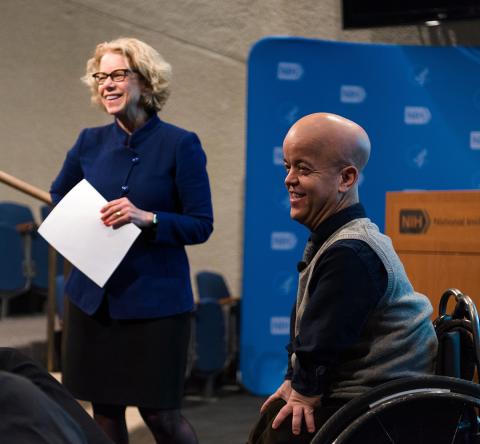Shakespeare Says
Help People with Disabilities Build Social Networks

Photo: Andrew Propp
Disability rights advocates have fought for accessible housing and transportation and reasonable accommodation at work and school. However, many have overlooked the need for people with disabilities to meet friends and romantic partners, said Dr. Tom Shakespeare during a Feb. 6 NICHD special lecture titled “Beyond Disability” in Lipsett Amphitheater.
“You can have the job, but you all want the partner and probably the family. That’s a general, average human aspiration,” said Shakespeare, professor of disability research at Norwich Medical School, University of East Anglia, U.K.
People with disabilities make up 15 percent of the world’s population. Half of those are over 60 years old, he said. Many of them don’t have the same opportunity as non-disabled people to socialize with their peers.
“Most people meet their partners at college or at work. Can you get to work? Can you get to college? Are you part of that?” he asked.
For many, the answer is no. If they are in a relationship, according to U.K. research, they are twice as likely to have met their partner online. “The internet actually liberates a lot of mobility-impaired people, a lot of deaf people, a lot of people on the autism spectrum,” he said.
People with disabilities—particularly those with intellectual disabilities—are perceived as “child-like and innocent.” The public does not perceive people with disabilities as potential romantic partners, Shakespeare said. In some countries, they might be prevented from marrying, sterilized against their will or subjected to sexual violence.
“They don’t get to have the risks, failures, the loves and the joys that most adolescents without disabilities might have,” he added.
Shakespeare has followed a group of people with disabilities for the past few decades. When he first met them, they generally lacked confidence and were unhappy. As they grew older, they became emotionally stronger and saw their peers begin to experience age-related health problems, such as a knee injury.

Photo: Andrew Propp
“Aging is good for people with disabilities,” Shakespeare said, noting that others start to gain an understanding of the physical problems people with disabilities have faced all their lives. “Everybody is complaining about something or going to the hospital for something. It’s not that different to what you have.”
As they grow up, those with disabilities shouldn’t be excluded from receiving sexual and reproductive health education, he said. Health professionals must ensure that people with disabilities have access to reproductive health services and watch closely for signs of sexual violence and abuse.
If society is going to support people with disabilities and allow them to have relationships, “we need to make sure the services we provide for them are accessible and adaptable.” The problems families that are led by parents with disabilities face are often products of their social situation, not their intellectual limitations, he added.
“We must search and try to find out what they want,” said Shakespeare, “and many people can indicate that with the right supports, rather than a sort of substitute decision-making, where the parent, guardian, lawyer or doctor says what’s best.”
